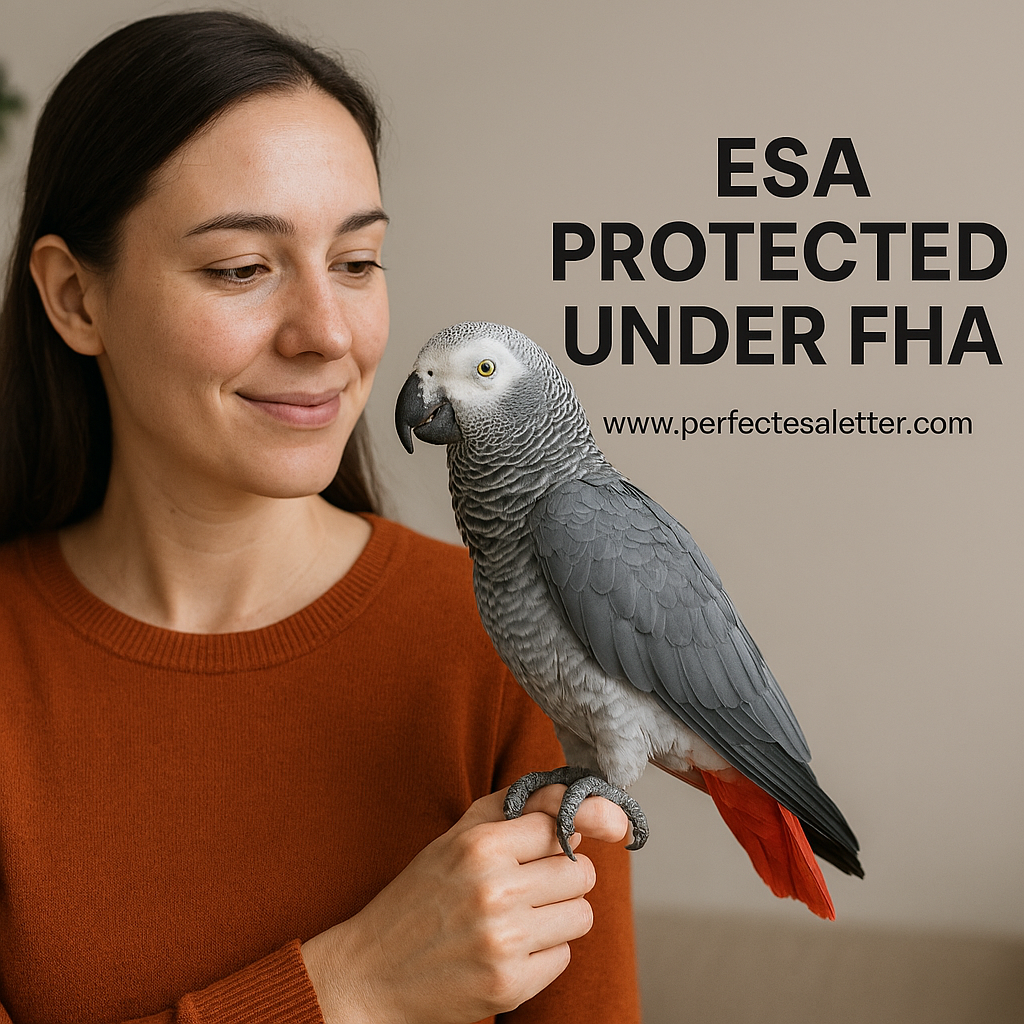How Emotional Support Animals Are Protected Under the Fair Housing Act (FHA)
🐾 How Emotional Support Animals Are Protected Under the Fair Housing Act (FHA)
The Fair Housing Act (FHA) is a cornerstone of U.S. housing law, protecting individuals from discrimination when renting or buying a home. For people with mental health conditions or emotional disabilities, Emotional Support Animals (ESAs) play a vital role in improving daily life. Because of their therapeutic benefits, the FHA provides specific protections for ESAs, requiring landlords to make reasonable accommodations.
This guide explains how ESAs are protected under the FHA, what documentation is required, what landlords can and cannot do, and how tenants can enforce their rights.
”Get Yours Now!
Don’t wait until a landlord or airline tells you “no pets allowed.” Protect your rights today.
Please fill out this form and our team wil contact you ASAP.
Complete your assessment in minutes , get approved by a licensed professional, and receive your letter within 24 hours.
📖 1. What Is the Fair Housing Act (FHA)?
The Fair Housing Act of 1968, enforced by the U.S. Department of Housing and Urban Development (HUD), prohibits housing discrimination based on race, color, religion, sex, national origin, familial status, or disability.
Since ESAs are directly connected to a person’s mental or emotional disability, the FHA recognizes them as a reasonable accommodation, ensuring equal access to housing opportunities.
📖 2. ESA vs. Pets Under FHA
Under FHA:
- ESAs are not legally considered pets.
- They are classified as assistance animals that provide therapeutic benefits to individuals with mental or emotional conditions.
- This distinction gives ESAs protections that ordinary pets do not have.
For example, if an apartment has a strict “no pets” policy, this policy does not apply to tenants with ESAs who present valid documentation.
📖 3. Key ESA Protections Under FHA
The FHA provides broad protection for ESA owners. Some key rights include:
- No Denial of Housing – A landlord cannot deny a tenant solely because they have an ESA.
- Exemption From Pet Restrictions – Breed, size, and weight restrictions applied to pets do not apply to ESAs.
- No Pet Fees – Landlords cannot charge pet rent, deposits, or fees for ESAs.
- Reasonable Accommodation – Landlords must adjust policies to allow ESAs, provided the request is reasonable.
These protections help ensure individuals with mental health needs have equal housing access.
📖 4. ESA Documentation Required for FHA Protection
To claim ESA protection under the FHA, tenants must provide an official ESA letter from a licensed mental health professional (LMHP).
The letter should:
- Confirm the tenant has a disability under the FHA’s definition.
- State that the ESA provides emotional or therapeutic benefits.
- Be issued within the last 12 months.
- Include the LMHP’s professional details and license information.
❌ Landlords cannot demand detailed medical records or specific diagnoses.
✅ They can only verify the letter’s authenticity.
📖 5. Landlord Obligations Under FHA
Under the FHA, landlords are legally required to:
- Accept valid ESA letters.
- Make exceptions to “no pet” or restricted pet policies.
- Waive additional pet-related fees.
- Avoid retaliatory actions, such as eviction threats, against ESA owners.
Landlords who violate FHA rules may face HUD complaints, lawsuits, and financial penalties.
📖 6. Tenant Rights Under FHA
Tenants with ESAs have the right to:
- Request reasonable accommodations without fear of discrimination.
- File a complaint with HUD if denied.
- Live with their ESA even in housing with strict no-pet rules.
- Refuse unnecessary disclosure of personal medical details.
📖 7. Exceptions to ESA Protection Under FHA
While protections are strong, there are exceptions. Landlords may deny an ESA if:
- The animal poses a direct threat to other tenants (e.g., aggressive dog).
- The animal causes substantial property damage.
- The request places undue financial or administrative burden on the landlord.
- The housing falls under FHA exemptions, such as small owner-occupied units (like a 4-plex where the landlord lives in one unit).
📖 8. Example Scenario
Imagine a tenant named Alex who suffers from anxiety and has a valid ESA letter for his cat. He applies to rent an apartment with a “no pets” policy. Under the FHA, the landlord must accept the ESA and cannot charge pet fees or deny his application based on the animal.
If the landlord refuses, Alex can file a complaint with HUD and pursue legal remedies.
📖 9. How to File a Complaint Under FHA
If a tenant’s ESA rights are violated, they can:
- File a complaint with HUD’s Office of Fair Housing and Equal Opportunity.
- Provide documentation such as the ESA letter and communication records.
- Seek legal representation if necessary.
HUD investigates and, if violations are confirmed, landlords can face fines and damages.
📖 10. Final Thoughts
The Fair Housing Act ensures that Emotional Support Animals are protected and that individuals with mental or emotional disabilities have equal access to housing. Tenants with valid ESA letters have the right to live with their ESA, free from discrimination, extra fees, or unfair restrictions.
For landlords, understanding FHA obligations is essential to avoid lawsuits and penalties. For tenants, knowing these rights can make the difference between secure housing and unlawful eviction.
By recognizing ESAs as more than pets, the FHA creates a fairer, more compassionate housing system for those who rely on emotional support animals.
”Get Yours Now!
Don’t wait until a landlord or airline tells you “no pets allowed.” Protect your rights today.
Please fill out this form and our team wil contact you ASAP.
Complete your assessment in minutes , get approved by a licensed professional, and receive your letter within 24 hours.

